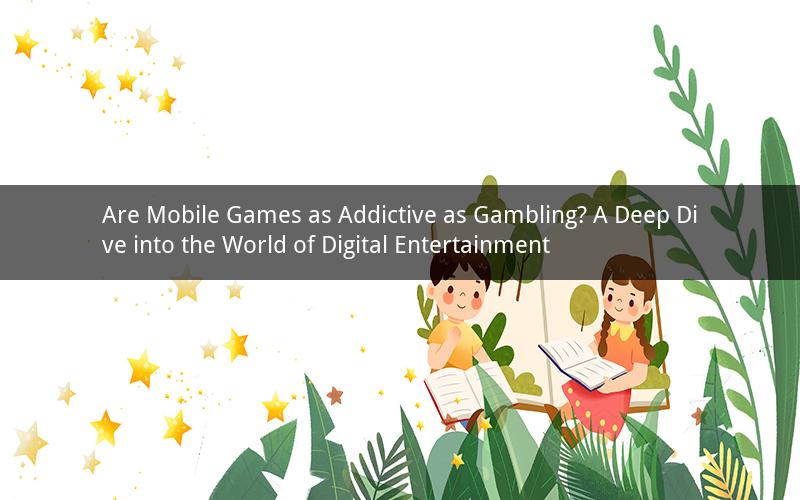
Introduction
Have you ever found yourself hooked on a mobile game, hours slipping away as you chase the next high score or level up? Mobile games have become an integral part of our daily lives, offering entertainment, social interaction, and even educational benefits. However, some argue that mobile games share an unsettling similarity to gambling, with their ability to captivate and manipulate users. This article delves into the debate, exploring the psychological hooks, design elements, and the fine line between entertainment and addiction.
The Allure of Mobile Games
Imagine a world where you can immerse yourself in a virtual realm at any moment, from the comfort of your couch to the commute. Mobile games provide this convenience, often for free, with in-app purchases available to enhance the experience. The allure lies in their accessibility and the instant gratification they offer.
Scenes from the Virtual World:
- Cityscape Simulations: Picture yourself as the mayor of a bustling metropolis, building skyscrapers and managing resources. The thrill of watching your city grow is unparalleled.
- Role-Playing Adventures: Step into the shoes of a hero in a fantasy world, battling dragons and completing quests. The narrative progression keeps you engaged, eager for the next chapter.
- Casino-style Games: Slot machines, poker, and blackjack are just a click away, offering the thrill of chance and the promise of big wins.
The Psychological Hooks
Mobile games are designed with psychological principles in mind, creating an immersive experience that can be hard to resist. Here are some of the key hooks:
- Variable Reward Schedules: Gamers are rewarded randomly, which creates a sense of anticipation and keeps them playing for longer.
- Progressive Difficulty: As you progress, the game becomes more challenging, requiring you to invest more time and effort to succeed.
- Social Interaction: Many mobile games encourage social interaction, whether through multiplayer modes or in-game communities.
Comparing to Gambling:
Gambling shares many of these psychological hooks. The anticipation of a win, the thrill of the unknown, and the social aspect of playing with others are all present in both mobile games and gambling.
Design Elements That Fuel Addiction
The design of mobile games is meticulously crafted to keep users engaged. Here are some elements that contribute to addiction:
- In-App Purchases: These allow users to bypass certain levels or unlock new features, often at a cost. The allure of instant gratification can lead to impulse purchases.
- Notifications: Push notifications keep players informed about their game progress, encouraging them to return and play more.
- Rewards and Achievements: Unlocking new rewards and achieving milestones provides a sense of accomplishment and encourages continued play.
Case Study: Candy Crush Saga
Candy Crush Saga is a prime example of a game that uses these design elements to its advantage. The simple yet engaging gameplay, coupled with the promise of new levels and rewards, has captivated millions of players worldwide.
The Fine Line Between Entertainment and Addiction
The line between entertainment and addiction can be blurry. Here are some signs that you might be crossing over:
- Neglecting Other Responsibilities: If you find yourself neglecting work, social activities, or personal care due to gaming, it may be time to reassess your habits.
- Financial Strain: Excessive spending on in-app purchases can lead to financial difficulties.
- Physical Symptoms: Excessive gaming can lead to physical symptoms such as eye strain, headaches, and neck pain.
Comparing to Gambling Addiction:
Gambling addiction shares many of these symptoms. The inability to control spending, the need for more money to sustain the thrill, and the negative impact on personal and professional life are all common in both conditions.
The Role of Developers
Mobile game developers have a responsibility to create games that are entertaining without being addictive. Some developers are taking steps to address this issue:
- Implementing Time Limits: Some games now have built-in timers to limit playtime.
- Transparency: Providing clear information about in-app purchases and their impact on gameplay.
- Parental Controls: Offering tools for parents to monitor and control their children's gaming habits.
Conclusion
Mobile games and gambling share a striking resemblance in their ability to captivate and manipulate users. While mobile games offer entertainment and social interaction, they also carry the potential for addiction. As players, it's important to recognize the signs of addiction and take steps to maintain a healthy balance. Developers, too, have a role to play in creating games that are both enjoyable and responsible.
Questions and Answers
1. Question: What are some common signs of mobile game addiction?
- Answer: Common signs include neglecting other responsibilities, excessive spending on in-app purchases, and experiencing physical symptoms such as eye strain or headaches.
2. Question: How can developers create mobile games that are both entertaining and responsible?
- Answer: Developers can implement time limits, provide transparent information about in-app purchases, and offer parental controls to create more responsible games.
3. Question: What are the psychological hooks used in mobile games?
- Answer: Common psychological hooks include variable reward schedules, progressive difficulty, and social interaction.
4. Question: How do mobile games compare to gambling in terms of addiction potential?
- Answer: Both mobile games and gambling share similar psychological hooks and design elements that can lead to addiction.
5. Question: What steps can players take to maintain a healthy balance with mobile games?
- Answer: Players can set time limits for gaming, prioritize other responsibilities, and be mindful of their spending habits to maintain a healthy balance.